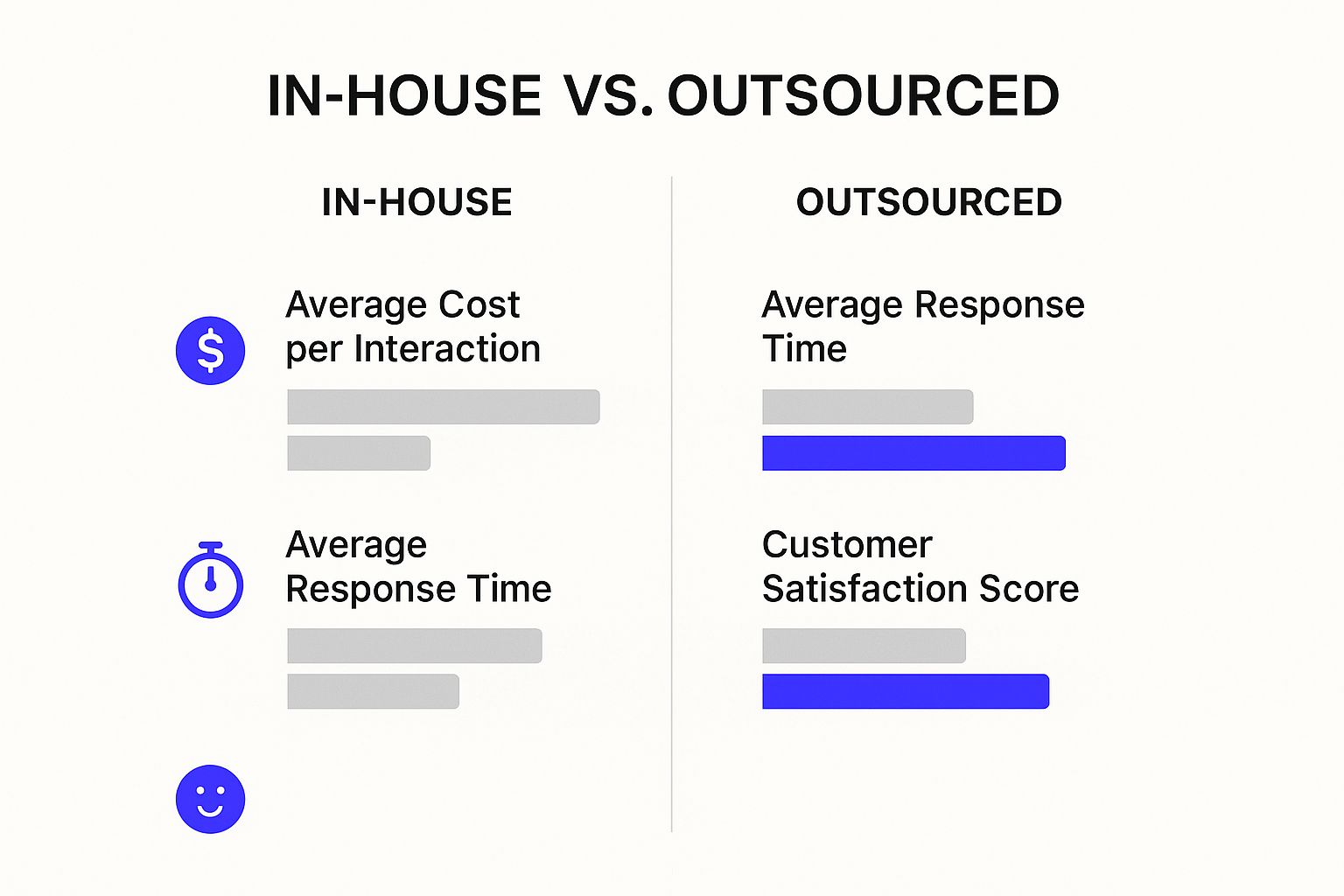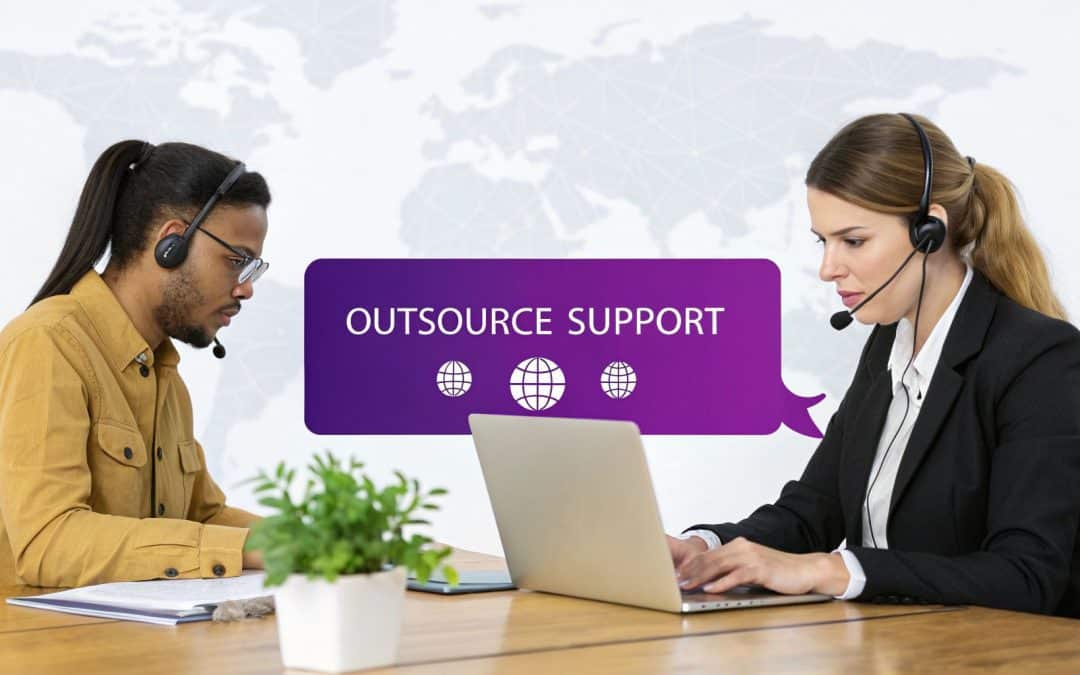Think of it this way: you’re an expert at your trade, whether that’s plumbing, electrical work, or HVAC repair. Your customers hire you for that specific skill. But what about all the calls, emails, and chats that keep your business running? That's where customer service outsourcing comes in.
It’s the practice of partnering with a specialized company to manage all your customer interactions. Instead of juggling phone calls while trying to manage a job site, you bring in a team of pros whose entire focus is on providing top-notch support. This allows you to focus on your core work while ensuring your customers always receive professional, timely help.

A Partnership Built for Growth
Let's stick with the expert analogy. As a home service professional, your time is best spent on the job, not tethered to a phone. Trying to do both often means one area suffers. Answering every call might mean delays on a project, while focusing on the project can lead to missed calls and lost business.
This is the classic dilemma that customer service outsourcing companies solve. They function as a natural extension of your team, handling all the inbound communication. They're not just an answering service; they're a fully integrated support department, scheduling jobs and resolving customer queries with the same care you would.
More Than Just Answering the Phone
Outsourcing isn't just about offloading tasks; it's a strategic move to run a smarter, more efficient business. A good partner brings a level of expertise and infrastructure that's tough for a growing home service company to build from scratch.
Here’s what you really gain:
- Expert Talent on Day One: You get a team trained in professional communication, problem-solving, and even upselling—without having to recruit and train them yourself.
- Big-League Technology: These companies come equipped with sophisticated phone systems, CRM software, and reporting tools that give you powerful insights into your customer interactions.
- Flexible Scalability: Business ebbs and flows. A partner can instantly scale your support up during a busy season (like a summer heatwave for an HVAC business) and back down when things quiet down, so you only pay for what you need.
By entrusting customer communication to the experts, your team is free to do what it does best: deliver outstanding service and find new ways to grow the business.
Customer service outsourcing is about bringing in specialists. You're not just hiring call-takers; you're plugging a professionally managed system directly into your business to boost customer happiness and operational horsepower.
How It Works in the Real World
Getting started is usually quite simple. You'll work with the partner to outline your specific needs, establish your brand voice, and document your standard operating procedures. From there, they train a dedicated team on everything from your service list to your scheduling software. To get a deeper look at how this works, check out this excellent UK Customer Care Outsourcing: A Complete Guide.
The end result? Your customers get fast, knowledgeable, and friendly service every time they reach out. They won’t know they're speaking to a partner; they’ll just know they're dealing with a professional company that values their business. This turns customer service from a necessary expense into a powerful tool for building loyalty and driving growth.
The Strategic Benefits of Outsourcing Your Support
Thinking about outsourcing customer support? It’s easy to get fixated on the cost savings, but the real magic happens when you see it as a strategic upgrade. Partnering with the right customer service outsourcing company is less about offloading tasks and more like plugging a high-performance engine straight into your business. It can genuinely reshape how you operate, how happy your customers are, and how fast you can grow.
The most immediate win? You can instantly offer 24/7 global support. For a home services company, this is huge. A homeowner with a burst pipe at 2 AM isn't going to wait for your office to open. A potential client researching new HVAC systems on a Sunday afternoon wants answers now. With an outsourced team, you can capture those moments, turning a crisis or a fleeting interest into a booked job.
That kind of around-the-clock availability isn't just a perk anymore; it's what customers expect. Delivering on that promise builds a ton of trust and keeps them coming back.

Unlocking Scalability and Flexibility
One of the biggest headaches for any home service business is dealing with fluctuating demand. Imagine it's the first heatwave of the summer, and your HVAC business is about to get slammed with calls for AC repairs. Trying to hire and train a temporary in-house team to handle that rush is slow, expensive, and a major distraction.
This is where an outsourcing partner shines. You can scale your support team up almost instantly to manage that peak season chaos. Then, when things cool down in the fall, you can just as easily scale back. This agility lets you match your operational costs directly to your revenue, so you're not stuck paying for extra staff during the slow months.
Outsourcing transforms your customer service from a rigid, fixed cost into a flexible, on-demand resource that breathes with the rhythm of your business.
And this isn't just for seasonal swings. It's incredibly valuable for handling the flood of inquiries from a big marketing campaign, unexpected growth spurts, or even a service outage that needs all hands on deck.
Gaining Access to Advanced Technology
Let's be honest: building a modern, effective customer support operation requires a serious investment in technology. The top outsourcing companies have already made that investment, giving you access to powerful tools that would be incredibly expensive to buy and manage on your own.
This tech stack typically includes things like:
- Omnichannel Platforms: These systems are game-changers. They pull all customer interactions—phone, email, live chat, social media—into one unified view. An agent can see a customer’s entire history at a glance, leading to way smarter and faster solutions.
- AI-Powered Analytics: These aren't just buzzwords. Advanced analytics can spot customer trends, pinpoint common problems, and track agent performance. You get deep insights that help you improve both your services and your support quality.
- Sophisticated CRM Integrations: A great partner will plug right into the CRM and scheduling software you already use. Their agents can book jobs and update customer records just like they were sitting in your office, making them a true extension of your team.
Having this technology at your fingertips gives you a serious competitive edge, without the massive price tag or implementation headaches. Your outsourced agents can also use these tools to better understand customer needs, which is a great way to spot potential https://phonestaffer.com/blog/what-is-sales-leads.
The proof is in the numbers. The global outsourced customer care market was valued at $99.66 billion in 2023 and is on track to hit $194.27 billion by 2033. This explosive growth is happening for a reason: businesses are eager to ditch the high costs of hiring and training while gaining the flexibility to manage fluctuating demand. By working with the right partner, companies can maintain excellent service and refocus their energy on what they do best.
How to Choose the Right Outsourcing Partner
Picking the right outsourcing partner is easily the most important decision you'll make in this entire process. Think of it like bringing a master plumber or electrician onto your crew. You wouldn't hire them based on their hourly rate alone, right? You'd look at their past work, talk to their references, and make sure they operate with the same high standards you do.
The exact same level of care is needed when you’re evaluating customer service outsourcing companies.
It's tempting to just compare price tags, but that's a classic mistake. A cheap service that frustrates your customers will end up costing you a fortune in lost jobs and a trashed reputation. The real goal is to find a partner who feels like a natural extension of your team, someone who will treat your customers with the same respect and urgency you would.
This means your evaluation has to go deep, focusing on the things that actually build a strong, lasting partnership.
Look for Proven Industry Expertise
Let's be honest: not all customer support is created equal. The know-how required to troubleshoot a software issue is worlds away from what's needed to handle a frantic call from a homeowner with a burst pipe. Your business needs a partner who gets the unique rhythm of the home services industry—the seasonal rushes, the common questions, and the absolute urgency of a service emergency.
A partner with the right experience already knows this stuff. They’ll have agents trained to handle the specific scenarios that pop up in plumbing, HVAC, or electrical work every single day. They know how to speak your customers' language and can turn that panicked call into a calmly scheduled appointment.
A partner with home service experience doesn't need to be taught the basics of your business. They arrive on day one ready to contribute, shortening the learning curve and delivering value almost immediately.
When you're talking to potential partners, ask them point-blank about their experience with companies like yours. Don't be shy—ask for case studies or specific examples of how they’ve handled support for other home service businesses. This kind of specialized knowledge is one of the best predictors of success.
Prioritize Cultural Fit and Brand Alignment
Your customer service team is, for all intents and purposes, the voice of your brand. When you outsource, you’re handing that voice over to someone else. It is absolutely essential that their values and way of communicating match yours. If your company is known for its friendly, local feel, a partner with a stiff, corporate tone will feel completely wrong to your customers.
So, how do you figure this out? You have to ask the right questions:
- How exactly do you train your agents on our brand's unique voice and values?
- Can we listen to a few sample calls from your work with other clients?
- What's your own company culture like, and how do you keep your team motivated?
A great partner will welcome these kinds of questions. They should be able to give you a clear, confident answer about how they soak up a client's culture and weave it into their support teams. This alignment is what makes the customer's experience feel seamless, as if they're talking to someone sitting right in your office.
Assess Training and Quality Assurance
The way a company trains its agents and checks their work tells you everything you need to know about its commitment to quality. A top-tier partner won’t just do a one-time training session and call it a day. They'll have a robust, ongoing program where agents are constantly learning about your services, your latest promotions, and any changes to your procedures.
Just as important is their quality assurance (QA) process. This is the system they use to review calls and chats to make sure they're hitting the mark.
Ask them to walk you through their QA framework:
- How often are customer interactions reviewed?
- What specific metrics do you track (e.g., first-call resolution, customer satisfaction)?
- How do you give feedback to agents so they can improve?
A transparent QA process is a hallmark of a mature, reliable outsourcing company. It proves they are serious about maintaining high standards and are accountable for their team's performance.
The chart below gives you a good visual of how outsourcing can affect key metrics when compared to handling support in-house.

As the data shows, while customer satisfaction can be quite similar, outsourcing often provides a major boost in response times and cost savings.
Comparison Checklist for Outsourcing Partners
When you start talking to different companies, it's easy for the details to get jumbled. This checklist is designed to help you systematically evaluate and compare potential partners side-by-side, so you can make a clear, data-driven decision.
| Evaluation Criteria | Vendor A | Vendor B | Vendor C |
|---|---|---|---|
| Industry Experience | |||
| Experience with Home Service Companies | |||
| Can Provide Relevant Case Studies | |||
| Understands Industry-Specific Terms | |||
| Brand & Cultural Fit | |||
| Alignment with Your Brand Voice | |||
| Provides Sample Calls/Transcripts | |||
| Positive Agent/Company Culture | |||
| Training & QA | |||
| Detailed Onboarding Process | |||
| Ongoing Agent Training Program | |||
| Transparent QA Process & Metrics | |||
| Regular Performance Reporting | |||
| Technology & Integration | |||
| Compatibility with Your CRM/Software | |||
| Provides 24/7 Coverage Options | |||
| Strong Data Security & Compliance | |||
| Cost & Contract | |||
| Clear and Transparent Pricing Model | |||
| Contract Flexibility & Exit Clauses | |||
| No Hidden Fees |
By filling this out for each contender, you'll have a much clearer picture of who truly stands out. It helps you move beyond a simple price comparison and focus on the factors that lead to a successful, long-term partnership.
The Role of Technology in Modern Outsourced Support
If you hear “outsourced support” and still picture a massive, noisy call center from the 90s, it’s time for an update. That image is completely out of date. Today’s best customer service outsourcing companies are more like tech hubs than traditional call centers. They come armed with a whole suite of digital tools designed to make customer support smarter, faster, and far more personal.
For a home service company, this tech-forward approach isn't just a "nice-to-have"—it's a game-changer. It’s the engine that lets a partner manage your customer calls and messages with incredible precision, turning every interaction into a chance to build real loyalty.
The Power of Omnichannel Platforms
Think about this common scenario: a customer emails you for a quote on a new AC unit. Later, they jump on your website's live chat to ask a follow-up question. Finally, they call to book the installation. Without the right tech, those are three separate, disconnected conversations. The customer has to repeat themselves every single time, which is a surefire way to frustrate them.
This is exactly the problem omnichannel platforms solve. They act as the central nervous system for all your customer communications, pulling every channel into one clean, unified timeline.
- Unified Customer History: An agent sees it all in one place—every call, email, chat message, and even social media DM. They have the full story before they even say, "Hello."
- Seamless Transitions: A conversation can start on chat and move to a phone call without missing a beat. No more lost context or starting from scratch.
- Consistent Brand Experience: It doesn't matter how a customer gets in touch; they get the same high-quality, informed service every single time.
This cohesive approach makes customers feel like you actually know them and value their time—a crucial feeling when they're dealing with something as stressful as a leaky pipe or a dead furnace.
AI and Automation as Agent Superpowers
Let's clear something up: Artificial Intelligence (AI) isn't here to replace your human agents. It’s here to make them better and more effective at their jobs. Top-tier outsourcing partners use AI to take care of the simple, repetitive stuff, freeing up their agents to handle the complex problems that really need a human touch.
The most obvious example is the AI chatbot. These bots are perfect for answering the simple, frequent questions you get all the time, like "What are your hours?" or "How do I schedule routine maintenance?" They give instant, 24/7 answers, which keeps customers happy and cuts down on the easy tickets human agents have to deal with. The world of modern outsourced support really leans on technology; articles discussing AI's empowering role in customer support give some great perspective on where things are headed.
But AI does a lot more behind the scenes, too:
- Automate Ticket Routing: AI can instantly read an incoming message, understand what it's about, and send it to the right person—like routing a billing question directly to your finance specialist.
- Suggest Responses: During a live chat, AI can feed an agent accurate answers or links to helpful articles, which dramatically cuts down on response times.
- Analyze Sentiment: AI tools can pick up on a customer's frustration in their tone or word choice, flagging the interaction so an agent can de-escalate or bring in a manager.
By automating the routine and augmenting the human, AI allows a smaller team of agents to accomplish much more, delivering a higher quality of service with remarkable efficiency.
The numbers really tell the story. By 2025, it's expected that 80% of companies will use chatbots for basic questions. We're already seeing AI-powered tools help speed up issue resolution by 52%. And with the AI customer service market projected to hit $4.1 billion by 2027, it's clear this isn't just a trend. When you consider that 88% of consumers now say their experience with a company is as important as the service itself, having a seamless omnichannel setup is no longer optional.
Data Analytics for Deeper Insights
Finally, the best outsourcing partners don't just handle calls; they use powerful analytics to turn all that interaction data into real business intelligence. They track the metrics that matter, like first-call resolution, average handle time, and customer satisfaction (CSAT) scores.
This data is a goldmine. It shows you exactly what your customers are struggling with, where your internal processes might be breaking down, and what your team is knocking out of the park. A great partner won't just dump a spreadsheet on you. They'll help you see the story in the data and use those insights to make smarter decisions about your services and the entire customer journey.
Best Practices for a Successful Outsourcing Partnership
Signing on the dotted line with a customer service provider is just the starting line, not the finish. The real work—and the real success—comes from how you build and manage that relationship day-to-day. Think of it like bringing a new master technician onto your crew; their success depends on clear communication, the right tools, and feeling like a valued part of the team.
A strong partnership can turn a simple service vendor into a powerful strategic asset. When you treat your outsourced team as a genuine extension of your own, they start acting like one. Neglecting this relationship is a classic misstep that can completely undo all the hard work you put into choosing the right partner.

Establish Crystal-Clear Service Level Agreements
A Service Level Agreement (SLA) is the absolute bedrock of your partnership. This isn't just a legal formality; it's the rulebook that spells out exactly what success looks like for both of you. A fuzzy SLA is a recipe for frustration and missed expectations, so getting this right from the very beginning is crucial.
Your SLA needs to pin down the key performance indicators (KPIs) that actually matter to your home service business. Don't just accept a generic template. Instead, focus on the outcomes that directly affect your customers' happiness and your company's bottom line.
A solid SLA should nail down specifics like:
- Maximum Wait Times: How many seconds can a customer wait on hold before an agent picks up? What's the target response time for a web chat?
- First-Call Resolution (FCR) Rate: What percentage of customer problems should be solved in a single conversation, without needing a callback or transfer?
- Customer Satisfaction (CSAT) Score: What's the minimum satisfaction rating agents need to maintain?
- Escalation Procedures: When an agent can't solve an issue, what's the exact, step-by-step process for getting it to someone who can?
By defining these goalposts upfront, you create a shared vision of success and a straightforward way to measure performance. It keeps everyone on the same page and holds your partner accountable.
Empower Agents with a Dynamic Knowledge Base
Your outsourced agents can only be as good as the information you give them. A deep and constantly refreshed knowledge base is the single most important tool in their arsenal. It's your business's ultimate playbook, containing everything an agent needs to sound like they've been working for you for years.
This can't be a static PDF you create once and then forget about. It has to be a living, breathing resource that's easy to search, allowing agents to find answers in seconds while a customer is on the line.
A well-maintained knowledge base doesn't just help agents—it directly shapes the customer experience. Fast, accurate information leads to faster, more consistent, and more reliable support.
Your knowledge base absolutely must include:
- Detailed Service Descriptions: Plain-English explanations of everything you do, from seasonal tune-ups to 24/7 emergency repairs.
- Standard Operating Procedures (SOPs): Step-by-step instructions for all the common tasks, like booking an appointment, taking a payment, or handling a service complaint.
- Frequently Asked Questions (FAQs): A constantly updated list of real questions your customers are asking.
This commitment to information is vital. Right now, 58% of business leaders outsource customer service, a figure expected to climb to 64% by 2025 as companies look to solve internal issues like a lack of investment in training. By giving your outsourced team world-class resources, you tackle this problem head-on and empower them to become true experts on your brand. You can explore more on the future of customer service outsourcing and its strategic importance.
Frequently Asked Questions About Outsourcing
Deciding whether to bring in an outside customer service team is a big step, and it’s natural to have a lot of questions. Getting straight answers is the only way to feel confident you're making the right move for your home service business. Let’s tackle some of the most common concerns we hear from owners just like you.
How Much Does Customer Service Outsourcing Cost?
This is almost always the first question on everyone's mind, and the honest answer is: it varies. The final price tag depends on a few major factors.
For starters, where the team is located makes a big difference. Offshore partners in places like Asia might run you $8-$15 per hour. Nearshore teams in Latin America or onshore services right here in the US or Europe will typically be in the $25-$50 per hour range.
Then there’s the pricing model itself. Some companies bill by the hour, some by the agent, and others by the individual phone call or chat. The complexity of the work matters, too. Always ask for a detailed quote that breaks everything down—agent training, tech fees, management costs—so you aren’t hit with surprise charges later on.
Will Outsourcing Hurt My Brand Reputation?
That’s a perfectly valid worry. After all, your company's reputation is everything. The truth is, when you do it right, outsourcing can actually strengthen your brand. A great partner doesn’t just answer calls; they become genuine ambassadors for your business. Their agents will get to know your company's voice, your values, and the nitty-gritty details of how you operate.
By setting clear expectations, checking in on quality regularly, and treating your outsourced team like a true extension of your own, you can deliver the kind of fast, professional, 24/7 support that customers rave about. This boosts your brand image, it doesn't harm it.
The secret is finding a partner who gets your culture and is committed to acting as a seamless part of your operation.
What Is the Difference Between BPO and a Call Center?
It helps to think of it this way: a call center is a specialist, while a Business Process Outsourcing (BPO) firm is more like a general contractor.
A traditional call center is built to do one thing really well: handle voice calls. It’s a focused service designed specifically for phone communication.
Business Process Outsourcing (BPO), on the other hand, is a much bigger umbrella. When you hire a BPO, you're handing off an entire business function, which often includes customer service but can cover much more. A full-service BPO might handle:
- Omnichannel Support: Juggling phone, email, live chat, and social media inquiries.
- Back-Office Tasks: Taking care of things like data entry, dispatching, or even billing.
- Technical Support: Walking customers through more complicated issues with your services.
So, in short, a call center can be one piece of a BPO's offering, but a BPO handles a much wider range of your day-to-day operational tasks.
How Do You Ensure Data Security with an Outside Partner?
Data security is completely non-negotiable, especially when you’re dealing with customer information. Digging into a potential partner's security setup is one of the most important parts of your vetting process. Don't be shy about asking for proof of their security certifications, like PCI DSS (for handling credit card payments) or ISO 27001 (the gold standard for information security).
Any partner worth their salt will have rock-solid security measures, including data encryption, secure networks, tightly controlled access to information, and regular audits from outside experts. Your contract needs to spell out exactly how your data will be handled, what the confidentiality rules are, and who is responsible if a breach happens. Don't sign a thing until every one of those details is perfectly clear.
Ready to stop missing calls and start booking more jobs? Phone Staffer provides trained, remote CSRs and VAs specifically for home service companies. We handle the hiring and training so you can focus on running your business. Learn more about how we can help.

